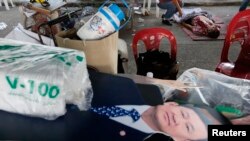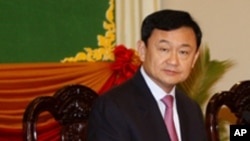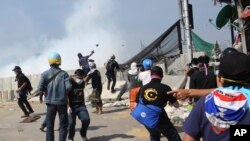BANGKOK —
Thailand's political future is cloudier than ever, but one thing is for certain — self-exiled former premier Thaksin Shinawatra won't be coming home soon.
The chances of another round of political conflict seemed slim a few months ago as the government of Thaksin's sister, Prime Minister Yingluck Shinawatra, entered its third year in office after a fairly smooth ride, much to do with outwardly cordial ties with her brother's enemies, among them generals, royal advisers and opposition politicians.
Having fled into exile to avoid a jail sentence for graft in 2008, Thaksin had hoped the climate was ripe for him to try to return. But now that seems less likely than ever.
Protesters have marched for weeks in Bangkok streets, clashing with riot police and vowing to overthrow the “Thaksin regime” and replace it with “good people,” effectively suspending Thailand's democratic system. Yingluck's honeymoon period is over and her government is clinging to power.
Her mistake appears to have been her Puea Thai party's attempts to ram through the legislature a political amnesty bill that outraged opponents, who called it a blatant move whitewash the divisive Thaksin of his crimes.
The Senate rejected the bill and Yingluck shelved it, but the damage was already done. Thaksin's opponents among the royalist, military-backed establishment and the parliamentary opposition had the pretext they needed to launch the latest salvo.
“Thaksin is the ghost of Thailand's politics and people just can't get over him,” said Pavin Chachavalpongpun of Kyoto University's Center for Southeast Asian Studies.
“Through the amnesty, he tested the waters, but these were deep, deep waters and that has provided the protesters with an opportunity to remove a threat to the old establishment.”
Though a ceasefire of sorts has been declared between demonstrators and the government to mark the 86th birthday of much revered King Bhumibol Adulyadej on Thursday, the battle lines have again been drawn in a long-running conflict, pitting a decades-old oligarchy against a new one that has emerged under Thaksin's rule.
Leader at large
Few think that Yingluck's party that won a 2011 election in a landslide by campaigning on Thaksin's name and populist policies is being run independently of him. The cabinet is stacked with his closest allies with whom he communicates via Skype and many Puea Thai lawmakers have met him overseas at his homes in Hong Kong and Dubai.
The amnesty bid is widely seen as a poor call by Thaksin, who might have been lulled into a false sense of security by Yingluck's peaceful run in office, her party's commanding parliamentary majority and the military's attempts to distance itself from the crisis after a series of bungled forays into politics since overthrowing Thaksin in a 2006 coup.
Under Yingluck, Thailand rebounded from the worst flood crisis in 50 years with economic growth of 6.5 percent in 2012.
A policy of tax rebates for first-time buyers of homes and cars won some middle-class support while a rice subsidy shored up already strong rural backing garnered from almost free healthcare, village grants and cheap loans under Thaksin.
Combined with a hefty war chest amassed from a telecoms business and ventures into gold and diamond mines and even a Premier League soccer club, billionaire Thaksin has the cash to spend on modern marketing campaigns that have won him or his proxies every election since 2001. It's likely they would win another if a snap poll was called, something Yingluck has refused to do.
That leaves the situation in a stalemate if Thailand wants to remain a democracy.
If Yingluck's government was forced out, it would only be a matter of time, given the electoral support, before Thaksin wrested back control, whether he's actually in Thailand or not.
Until then, Thaksin may have left his sister with a lot to contend with.
“This amnesty fiasco has blown up in his face, the anti-Thaksin crusade has been reignited and there's every indication this will not stop here,” said Thitinan Pongsudhirak, a political analyst at Bangkok's Chulalongkorn University.
“These protests have been condoned and supported by large segments of the Bangkok-based establishment. It looks very clear the protesters have strategic backing and if the military intervenes, it will certainly not be on the side of the government.”
The chances of another round of political conflict seemed slim a few months ago as the government of Thaksin's sister, Prime Minister Yingluck Shinawatra, entered its third year in office after a fairly smooth ride, much to do with outwardly cordial ties with her brother's enemies, among them generals, royal advisers and opposition politicians.
Having fled into exile to avoid a jail sentence for graft in 2008, Thaksin had hoped the climate was ripe for him to try to return. But now that seems less likely than ever.
Protesters have marched for weeks in Bangkok streets, clashing with riot police and vowing to overthrow the “Thaksin regime” and replace it with “good people,” effectively suspending Thailand's democratic system. Yingluck's honeymoon period is over and her government is clinging to power.
Her mistake appears to have been her Puea Thai party's attempts to ram through the legislature a political amnesty bill that outraged opponents, who called it a blatant move whitewash the divisive Thaksin of his crimes.
The Senate rejected the bill and Yingluck shelved it, but the damage was already done. Thaksin's opponents among the royalist, military-backed establishment and the parliamentary opposition had the pretext they needed to launch the latest salvo.
“Thaksin is the ghost of Thailand's politics and people just can't get over him,” said Pavin Chachavalpongpun of Kyoto University's Center for Southeast Asian Studies.
“Through the amnesty, he tested the waters, but these were deep, deep waters and that has provided the protesters with an opportunity to remove a threat to the old establishment.”
Though a ceasefire of sorts has been declared between demonstrators and the government to mark the 86th birthday of much revered King Bhumibol Adulyadej on Thursday, the battle lines have again been drawn in a long-running conflict, pitting a decades-old oligarchy against a new one that has emerged under Thaksin's rule.
Leader at large
Few think that Yingluck's party that won a 2011 election in a landslide by campaigning on Thaksin's name and populist policies is being run independently of him. The cabinet is stacked with his closest allies with whom he communicates via Skype and many Puea Thai lawmakers have met him overseas at his homes in Hong Kong and Dubai.
The amnesty bid is widely seen as a poor call by Thaksin, who might have been lulled into a false sense of security by Yingluck's peaceful run in office, her party's commanding parliamentary majority and the military's attempts to distance itself from the crisis after a series of bungled forays into politics since overthrowing Thaksin in a 2006 coup.
Under Yingluck, Thailand rebounded from the worst flood crisis in 50 years with economic growth of 6.5 percent in 2012.
A policy of tax rebates for first-time buyers of homes and cars won some middle-class support while a rice subsidy shored up already strong rural backing garnered from almost free healthcare, village grants and cheap loans under Thaksin.
Combined with a hefty war chest amassed from a telecoms business and ventures into gold and diamond mines and even a Premier League soccer club, billionaire Thaksin has the cash to spend on modern marketing campaigns that have won him or his proxies every election since 2001. It's likely they would win another if a snap poll was called, something Yingluck has refused to do.
That leaves the situation in a stalemate if Thailand wants to remain a democracy.
If Yingluck's government was forced out, it would only be a matter of time, given the electoral support, before Thaksin wrested back control, whether he's actually in Thailand or not.
Until then, Thaksin may have left his sister with a lot to contend with.
“This amnesty fiasco has blown up in his face, the anti-Thaksin crusade has been reignited and there's every indication this will not stop here,” said Thitinan Pongsudhirak, a political analyst at Bangkok's Chulalongkorn University.
“These protests have been condoned and supported by large segments of the Bangkok-based establishment. It looks very clear the protesters have strategic backing and if the military intervenes, it will certainly not be on the side of the government.”















